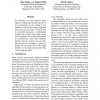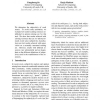120 search results - page 3 / 24 » How Much Can We Gain from Supervised Word Alignment |
IAT
2010
IEEE
13 years 8 months ago
2010
IEEE
When its human operator cannot continuously supervise (much less teleoperate) an agent, the agent should be able to recognize its limitations and ask for help when it risks making...
COLING
2008
13 years 11 months ago
2008
We generalize Uno and Yagiura's algorithm for finding all common intervals of two permutations to the setting of two sequences with many-to-many alignment links across the tw...
ACL
2007
13 years 11 months ago
2007
We present a general framework to incorporate prior knowledge such as heuristics or linguistic features in statistical generative word alignment models. Prior knowledge plays a ro...
CIBCB
2007
IEEE
14 years 4 months ago
2007
IEEE
Abstract— Multiple sequence alignment is an important problem in computational biology. A-star is an algorithm that can be used to find exact alignments. We present a simple mod...
COLING
2008
13 years 11 months ago
2008
We determine the subjectivity of word senses. To avoid costly annotation, we evaluate how useful existing resources established in opinion mining are for this task. We show that r...


